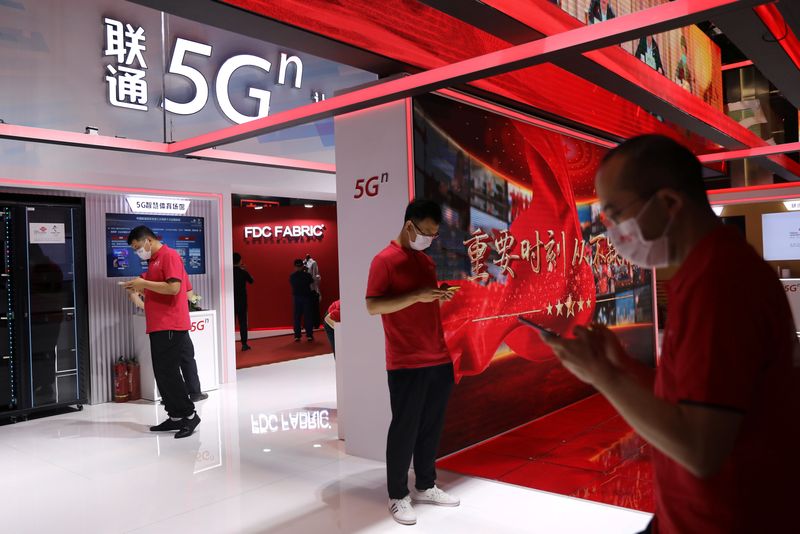SHANGHAI/HONG KONG (Reuters) - As Chinese authorities signal that a two-year crackdown on the domestic technology sector is over, global investors are relieved and yet loath to take the government at its word.
Foreign investors have been returning to mainland markets since May as its stringent COVID-19 lockdowns ease and after pledges from China's highest policymakers, including Vice Premier Liu He, to support an economy staring at recession.
More explicit signs that the regulatory crackdown that crippled the technology sector is easing came this week with reports ride-hailing firm Didi Global and billionaire Jack Ma's Ant Group, the fintech affiliate of conglomerate Alibaba (NYSE:BABA), are getting out of the regulatory doghouse.
Yet, the lure of a battered and cheap market and the prospect of domestic economic stimulus have not won investors over completely.
"I do not think that the crackdown is behind us for good as the Chinese will do what they need to when they feel like it. Unfortunately, I think it's that simple," said Jimmy Lee, chief executive officer of The Wealth Consulting Group, a wealth management firm.
Lee expects U.S.-listed shares of Chinese firms to remain volatile, but says "for now I think that the government wants to revive its economy and is giving investors reasons to be optimistic."
In some respects, Thursday's news that China's central leadership had given Ant Group a tentative green light to revive its initial public offering (IPO) brings to a close a crackdown that began with the stalling of that IPO in November 2020.
A Shanghai-based fund manager, who declined to be identified, said an Ant IPO or a completion of its restructuring, would send a very positive signal to the market. But he cautions that Ant is not technically ready for an IPO as it has not yet obtained necessary licences for its revamped business, and that "even if it's listed, Ant has become a very different animal".
Andy Maynard, head of equities at China Renaissance, is buying Chinese stocks, while waiting for the Ant IPO to actually happen.
"It's a begrudging thawing of regulatory pressure," said Maynard. "If the economy was still positive and COVID wasn't a problem, they would be still be putting the hammer down on the heads of tech."
TWO OUT OF THREE
Alibaba is the largest position on the books of Thomas Hayes, chairman and managing member of Great Hill Capital, a New York-based hedge fund. To Hayes, the turning point was when Ant appointed the Hong Kong exchange's chairman, Laura Cha, to its board this month. He is now waiting for his thesis of a meaningful rally to play out.
"There will be setbacks and bumps along the way, but the tide has changed," Hayes said, adding that Alibaba's roughly 60% rise since March was just the start of what he expected to be a strong rally.
Brian Jacobsen, a senior investment strategist at Allspring Global Investments, an asset manager based in Charlotte, North Carolina, whose team is now warming up to Chinese stocks, said the uncertainties remained but the expectation was for China to be less strict.
"At some point, investors have to just accept the risks and decide if prices have moved low enough," he said.
Mainland shares are cheap. According to Refinitiv data, Chinese companies' earnings are estimated to grow 12.4% in 2022 but their forward 12-month price-to-earnings ratio is at 9.62, the second lowest in Asia after South Korea.
Foreign investors have been on a buying streak since May 27, according to flows data for the Stock Connect programme linking mainland markets to Hong Kong. For the month through June 9, they had bought A-shares worth 29.6 billion yuan ($4.4 billion) versus 16.8 billion yuan for all of May.
"We've seen some overseas money come back, including some long-term money, which doesn't leave immediately. Money from Middle East, Europe, or even the U.S," the Shanghai fund manager said.
Of the three big risks to the economy - regulation, COVID-19 lockdowns and that of Chinese shares being delisted from U.S. exchanges - investors are cognisant that the last still remains a big one.
The S&P China ADR index is down 55% since Nov. 2020, the month Ant's IPO stalled, marking the start of the regulatory crackdown.

Alibaba shares are up by more than a third since late April, but still down by nearly two-thirds from their peak in late October 2020.
"I can say that the Jack Ma disappearing act is still something that factors into my opinion on what the reality is for Chinese free markets and how that may affect valuations for certain companies," Jimmy Lee said.